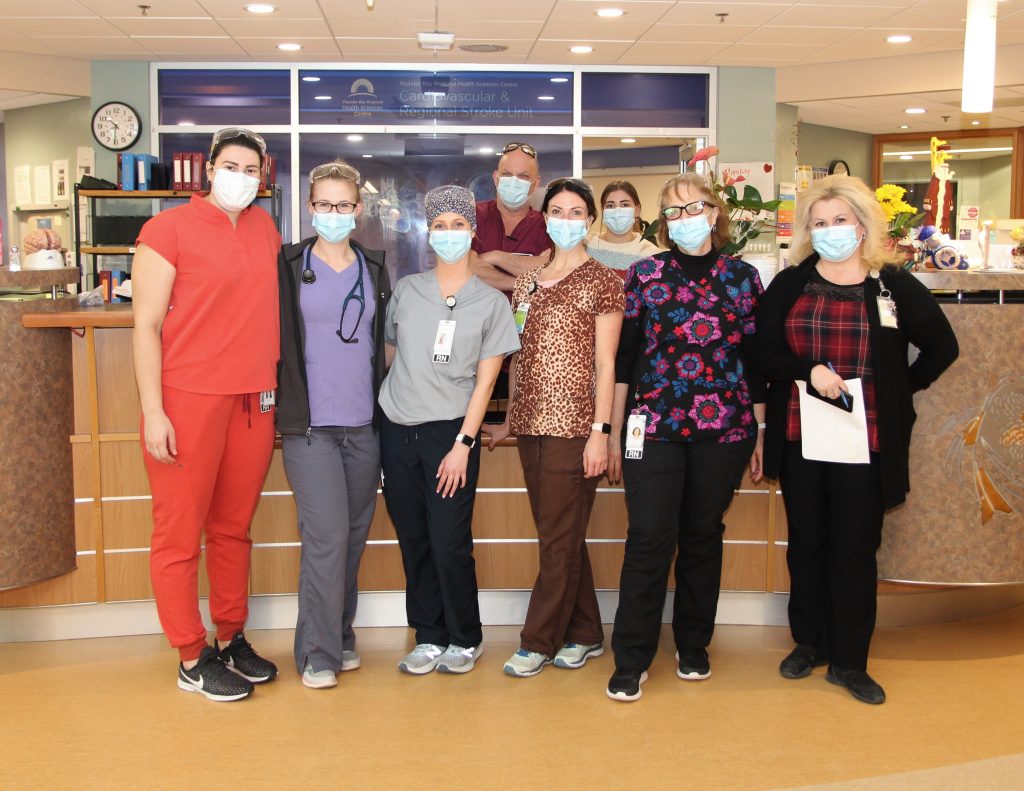
The Medical, Cardiology and Regional Stroke Unit (2C) at the Thunder Bay Regional Health Sciences Centre provides inpatient and outpatient care to the cardiovascular and stroke patients in our region. The unit provides care for patients who may of have had a cardiac event, who require further tests and observation, who have had or are preparing for surgery, and/or who are recovering from surgery.
The unit is made up of 36 inpatient beds, 24 of which are cardiovascular and medical care beds and 12 of which are regional stroke care beds.
In addition, the unit has an additional six-bed angioplasty short stay unit. In this area, our team provides care to inpatients, outpatients and regional patients from our community after undergoing intervention in the Cardiac Catheterization Lab. Patients receive monitoring after procedures such as angioplasty and sometimes pacemaker insertion until discharge to their home or community hospital.
To learn more about the regional stroke unit beds, click here.
Meet Your Cardiovascular Team
Your cardiovascular team is made up of many healthcare providers specializing in cardiovascular care. All have completed advanced training in their fields to ensure the best possible care for our patients.
Cardiologists
Your cardiologist will be your most responsible physician (MRP) or will be consulted to see you while under the care of another physician while you are admitted to the Cardiovascular Unit. They will oversee all aspects of your care and recovery, helping to determine the best plan of care to meet your recovery goals.
Nurse Practitioners
Nurse Practitioners on the Cardiovascular Unit provide ongoing assessments for patients, help in developing a care plan, and provide information to patients and their families. They work closely with other team members to ensure excellent, consistent care.
Nurses
Nurses with advanced training in cardiovascular care provide the minute-by-minute care for the patients, taking vital signs, providing medications, and following the patient’s care plan. They talk regularly with other nurses and team members to coordinate care. Your cardiovascular nurse is also a great source of information, and they are open to questions from patients and family members about the care you are receiving.
Social Workers
Social workers provide professional assistance with the needs of patients and families. They can help to assess and determine what resources patients and families might require, provide them with information on agencies to assist with various needs, and generally assist with other family difficulties.
Dietitians
Many patients who experience a cardiac event or who undergo a cardiovascular procedure will benefit from a change in diet. Dietitians provide information for patients and families about healthy choices moving forward. While admitted, dietitians also closely monitor the nutritional balance on an ongoing basis and make changes according to the patient’s needs.
Pharmacists
Pharmacists collaborate with the care team to select the right medicines at the correct dose for patients. Pharmacists also help to decrease medication side effects and provide valuable information to the team members.
Utilization Coordinator
The utilization coordinator plays an important role in admitting and discharge of patients, streamlining the process where possible to help make beds available again for those patients who need it.
Family Involvement in Patient Care
Families play an important role in patient care. The Cardiovascular Unit care team, as part of our Patient and Family Centred Care (PFCC) approach, believes in:
- Dignity
- Information Sharing
- Participation
- Collaboration
We include patients and family members (where appropriate) in all decisions involving care. This allows for the patient and family to express their preferences in care options, and for the team to ensure understanding of the care plan. In fact, the more active patients and their families are in their own care, the better outcomes tend to be.
What to Expect
Pre-Admission and Getting Ready for Surgery
If you will be admitted to the Cardiovascular Unit for surgery, please refer to Surgical and Ambulatory Services for more information, click here.
Catheterization Lab Tests
If you will be admitted to the Cardiovascular Unit for tests or procedures performed in our Cardiac Catheterization Lab, please refer to Cardiac Catheterization Lab for more information, click here.
If you’ve been referred to Cardiac Surgery:
Our Regional Cardiovascular Triage Nurse will contact you personally at the bedside at TBRHSC to explain the process steps involved in traveling to our partner site, Peter Munk Cardiac Centre, University Health Network, Toronto or other cardiac sites.
A travel package including information on travel grants, hospital map and hotel suggestions will be discussed and provided.
Note: Traveling home via commercial flights is the standard process for all patient post cardiac procedure and or surgery.
For further information, call the Regional Cardiovascular Triage Nurse at 807-684-6676.